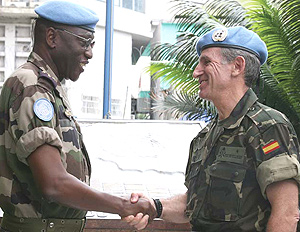Authorities of the UN peace keeping forces in the Congo (MONUC) Saturday evening failed to confirm whether the newly appointed force commander had resigned hardly a month after taking office. General Vincente Diaz de Hellega, from Spain took over from Senegalese General Babacar Gaye, late last month as head of the UN’s largest peace keeping force. Sources from the Kinshasa offices of the UN Special Representative of the Secretary General (SRSG) tipped off The New Times that the Spanish general had handed in his resignation to the SRSG, Alan Doss.


Authorities of the UN peace keeping forces in the Congo (MONUC) Saturday evening failed to confirm whether the newly appointed force commander had resigned hardly a month after taking office.
General Vincente Diaz de Hellega, from Spain took over from Senegalese General Babacar Gaye, late last month as head of the UN’s largest peace keeping force.
Sources from the Kinshasa offices of the UN Special Representative of the Secretary General (SRSG) tipped off The New Times that the Spanish general had handed in his resignation to the SRSG, Alan Doss.
"His main reasons were that the mission lacked of a clear vision and was doomed to fail,” said our source.
"His frustrations stem from his belief that the mission had been compromised from the word go. The DRC government authorities also came under his sharp criticism saying there was no serious leadership in the country.”
MONUC has of recent been in the public arena over several scandals stretching from sexual abuse to illegal dealing in gold. Some members of the team were also accused of supplying rebel groups with arms in exchange for minerals.
Repeated telephone calls to the MONUC military spokesman in Kinshasa, Lt. Col Jean-Paul Dietrich, were ignored and an email sent to the same was unanswered by the time we went to press.
When The New Times contacted, Joe Felli, the MONUC liaison officer in Kigali, he said he was not aware of the news and referred this author to a lady known as Sylvie who kept cutting short calls to her mobile phone.
Observers of the DRC conflict claim that if Gen Hellega’s resignation is confirmed, it would be a heavy blow to the efforts to bring peace to the embattled country.
His predecessor, Babacar Gaye, had been accused by the main rebel group, CNDP, of having been compromised and openly siding with the government side.
A fortnight ago UN helicopters opened fire on CNDP troops who were attempting to dislodge a combined forces of government troops (FARDC) and Rwandan rebels of the FDLR from the town of Masisi.
Gaye and Alan Doss were also accused of not doing enough to implement UN Security Council resolutions to disarm the FDLR, remnants of the former government army and Interahamwe militia responsible for the 1994 Genocide of Tutsis in Rwanda.
CNDP spokesman Bertrand Bisimwa told The New Times last week that they were perplexed by MONUC’s inertia in the face of clear evidence of FARDC’s collaboration with the FDLR in the current conflict.
"We fail to understand why MONUC is not acting against the FDLR who are the main cause of the conflict,” Bisimwa said.
The situation in the DRC has worsened with rebels of the Ugandan Lord’s Resistance Army (LRA) led by the self-styled mystic Joseph Kony, being the latest entrants in the already overcrowded conflict.
Ends


